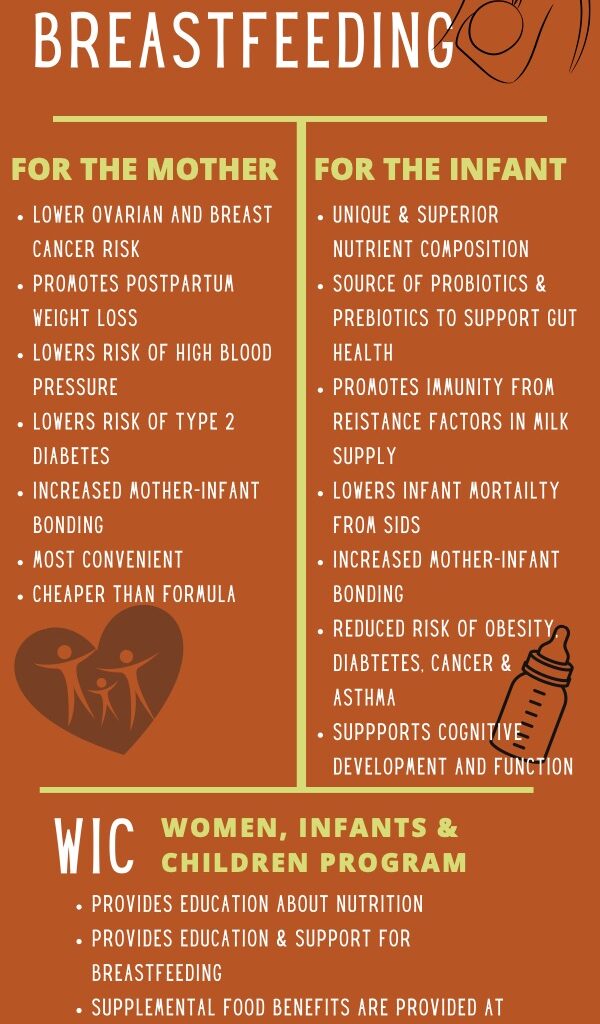Guest post by Alexa Guelig
According to the director of the CDC’s Division of Nutrition, Physical Activity, and Obesity, breastfeeding provides unmatched health benefits for babies and mothers. It is the clinical gold standard for infant feeding and nutrition, with breast milk uniquely tailored to meet the health needs of a growing baby. Breastfeeding has lasting benefits to both the mother and infant even after weaning.
Benefits of Breastfeeding for Mothers
- Reproductive health benefits by lowering risk of breast and ovarian cancer
- Promotes postpartum weight loss
- Supports bonding between mother and infant
- Lowers risk of high blood pressure
- Lowers risk of type 2 diabetes
- Economically beneficial by being a cheap and convenient option
Benefits of Breastfeeding for Infants
- Superior nutrient composition
- Contains probiotics and prebiotics for gut and immune health
- Promotes strong immune systems due to high amount of resistant factors
- Lowers infants mortality due to lower incidence of Sudden Infant Death Syndrome (SIDS)
- Fewer acute illness of digestive tract and respiratory tract
- Reduced risk of chronic illnesses such as obesity, diabetes, cancer, asthma, celiac disease
- Supports cognitive development and function

3 Stages of Milk Production (aka lactogenesis)
Not all milk is equal. There are three stages of milk production and milk composition which may vary, depending on time of feeding.
- Lactogenesis I – first couple of days postpartum
- Very small amount of milk known as colostrum is produced
- High in immunoglobulins to protect infants from infections
- Lactogenesis II – begins 2-5 days postpartum
- Onset of milk creation known as transitional milk
- Rapid changes in milk composition and volume
- Lactogenesis III – begins 10 days postpartum
- Milk production is established based on supply and demand
- Mature human milk has relatively stable composition
- Women should breastfeed at least 15 minutes on each breast to ensure milk with the maximum nutrient profile is secreted
Breastfeeding Fast Facts
- Only 1 in 4 infants is exclusively breastfed by the time they are 6 months as recommended.
- Low rates of breastfeeding add over $3 billion a year to medical costs for the mother and child in the United States.
- Black infants are 15% less likely to have ever been breastfed than White infants.
Support for Breastfeeding Mothers
- Common barriers to breastfeeding include: lack of knowledge and awareness, social norms, employment and childcare issues, lack of health services.
- Many specific actions are developed to increase support for breastfeeding and to overcome barriers. These actions emphasize that support is needed at the individual and family level, by communities, health care providers, employers, through research and surveillance, and in public health infrastructure.
- Women should breastfeed at least 15 minutes on each breast to ensure milk with the maximum nutrient profile is secreted.
If you’re an expecting mother or know of an expecting mother, reach out to a local Women, Infants, and Children (WIC) Program to see if you qualify for assistance. The goal of WIC is to assure healthy pregnancies, healthy birth outcomes, and healthy growth and development for women, infants, and children up to age five who are at nutritional risk, by providing nutritious supplemental foods, breastfeeding promotion and support, education on healthy eating, and referrals to healthcare and critical social services. Breastfeeding support is a core mission for WIC, but fathers, grandparents, step-parents, and foster parents can also receive support. Contact one of the 10,000 clinics nationwide by following this link.
Join us on Instagram throughout August to learn more about Breastfeeding Awareness!

Editor’s Note: We acknowledge and respect that not every mother can or may be able to breastfeed and that there are certain contraindications to breastfeeding or feeding expressed breast milk to infants.
References:
- https://www.cdc.gov/breastfeeding/about-breastfeeding/why-it-matters.html
- https://www.fns.usda.gov/wic
Alexa Guelig is a dietetics student at the University of Wisconsin-Madison.




0 Comments